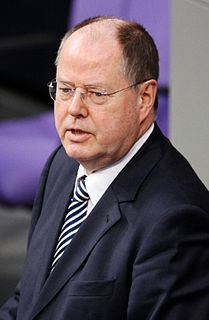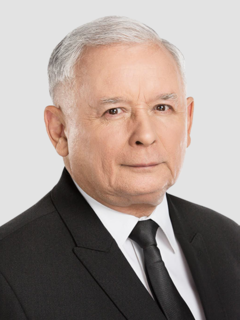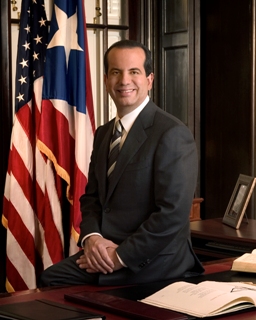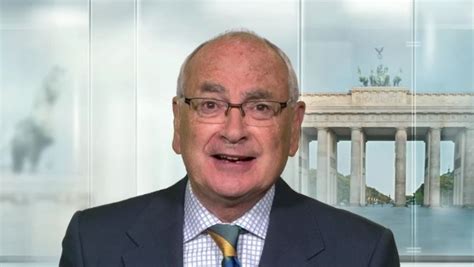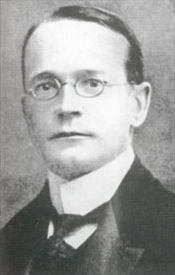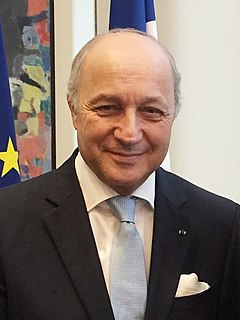A Quote by Peer Steinbruck
One has to explain to people that the EU in this form is the answer both to 1945 and to the 21st century, in a dramatically altered world with new heavyweights, and that Germany benefits from the continued integration of Europe in political, economic and societal ways. And, of course, that means the Germans will have to pay.
Related Quotes
Germany's potential makes up about 20% of the EU's overall economic power, including Great Britain. The German army is by no means strong enough to guarantee the security of the EU's two endangered flanks - in the east and in the south. So all that remains for Germany is partnerships with its neighbours and other EU member states. Germany should stick to that role.
Is it in the interests of Britain to leave or remain in the EU? As we saw in the referendum, there are different Britains and they see their interests in different ways. For a lot of everyday blokes the EU affected their sense of identity in ways they disliked, and they were right in thinking that the EU didn't return much to them by way of economic benefits.
The largest weight is now on Germany's shoulders. Chancellor Merkel must continue to convince people of the EU's importance; she must spearhead the effort to redefine the EU. In order to do this, Germany must become a muscular democracy. It needs to shoulder far more responsibility for the physical security of Europe, especially Eastern Europe and the Mediterranean. So far, unfortunately, Germany has taken the lead in disrespecting Europe's borders by opening its doors to more than a million refugees and migrants.
Germany has become the economic heart of Europe because our leaders are weak. But Germany should never forget that France is Europe's political heart. What is happening here today foreshadows what will happen in the rest of Europe in the coming years: the great return of the nation-state, which they wanted to obliterate.
If I were a German today, I would be proud, proud but also worried. I would be proud of the magnificent achievement of rebuilding my country, entrenching democracy and assuming the undoubtedly preponderant position in Europe. But a united Germany can't and won't subordinate its national interests in economic or in foreign policy to those of the Community indefinitely. Germany's new pre-eminence is a fact - and its power is a problem - as much for Germans as for the rest of Europe.
I believe that the Europeans, first and foremost, the Germans, will also understand me. Let me remind you that in the course of political consultations on the unification of East and West Germany... some nations that were then and are now Germany's allies did not support the idea of unification. Our nation, however, unequivocally supported the sincere, unstoppable desire of the Germans for national unity. I am confident that you have not forgotten this, and I expect that the citizens of Germany will also support the aspiration of the Russians, of historical Russia, to restore unity.
The EU is an alliance that the Americans control, in which the EU of course has a great deal of autonomy, but in which it still is very dependent on the United States, especially militarily, but not only in that respect. So to blame the Germans for everything is an easy way out for some of those suffering in Europe today.
The Security Council represents the situation from 1945 - you had the Allies who won the war who occupied that. The defeated guys - the Germans and Japan - were out. The occupied countries had no voice. That was fine in '45, but today, Germany rules Europe, frankly. They are driving Europe but have no voice.
Germany will always do the minimum to preserve the euro. Doing the minimum, though, will perpetuate the situation where the debtor countries in Europe have to pay tremendous premiums to refinance their debt. The result will be a Europe in which Germany is seen as an imperial power that will not be loved and admired by the rest of Europe - but hated and resisted, because it will perceived as an oppressive power.
If Turkey become a member of the EU, of course Turks would lose a part of this identity, just as Europe would lose a part of its own. It would also be a different Europe then. Accepting Turkey into the EU is an ambitious political endeavor of historical proportions. Europe would become a strong, multi-religious unit.
Thanks to the euro, our pockets will soon hold solid evidence of a European identity. We need to build on this, and make the euro more than a currency and Europe more than a territory... In the next six months, we will talk a lot about political union, and rightly so. Political union is inseparable from economic union. Stronger growth and Euorpean integration are related issues. In both areas we will take concrete steps forward.
